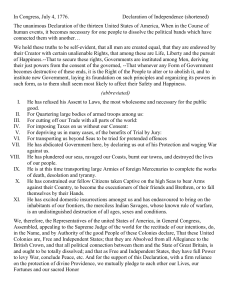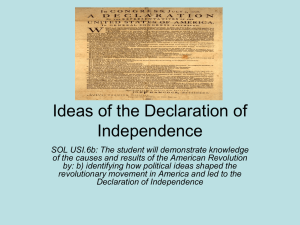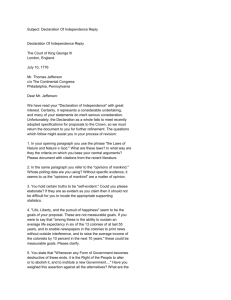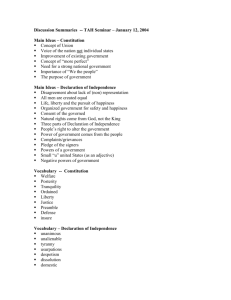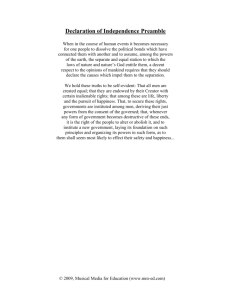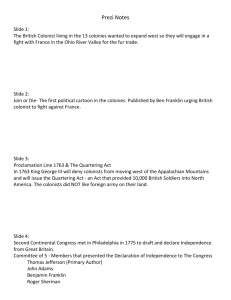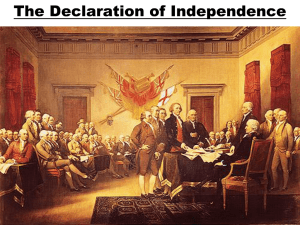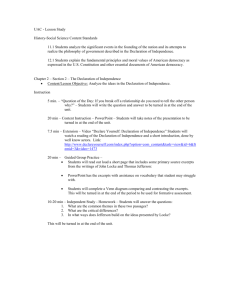Declaration Slides
advertisement
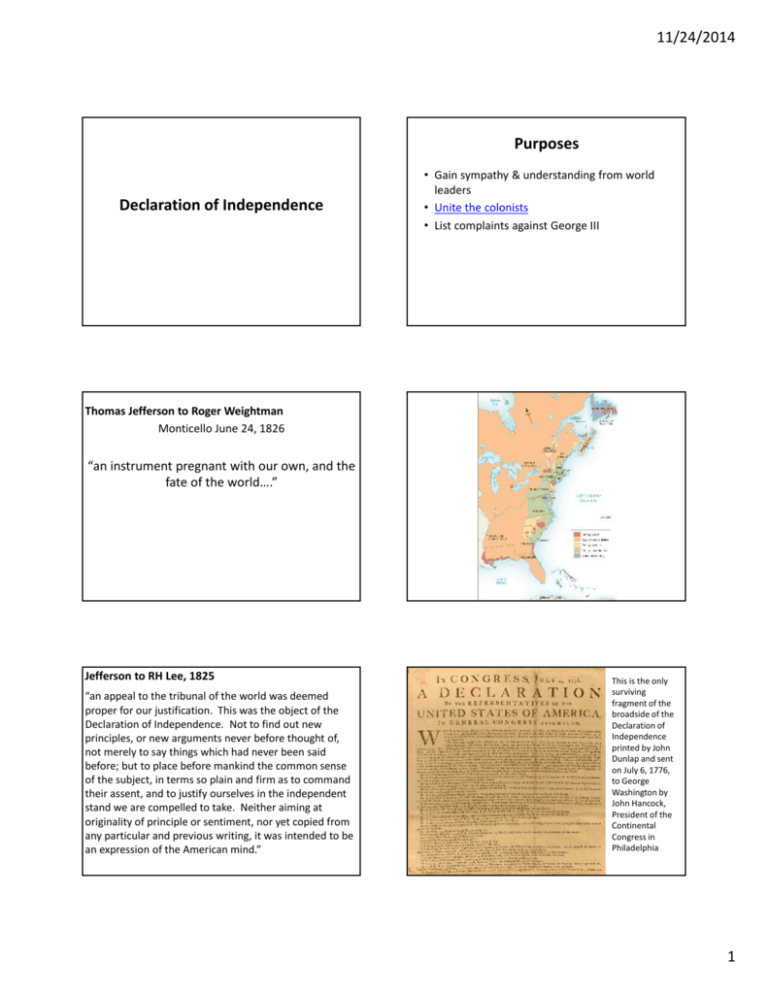
11/24/2014 Purposes Declaration of Independence • Gain sympathy & understanding from world leaders • Unite the colonists • List complaints against George III Thomas Jefferson to Roger Weightman Monticello June 24, 1826 “an instrument pregnant with our own, and the fate of the world….” Jefferson to RH Lee, 1825 “an appeal to the tribunal of the world was deemed proper for our justification. This was the object of the Declaration of Independence. Not to find out new principles, or new arguments never before thought of, not merely to say things which had never been said before; but to place before mankind the common sense of the subject, in terms so plain and firm as to command their assent, and to justify ourselves in the independent stand we are compelled to take. Neither aiming at originality of principle or sentiment, nor yet copied from any particular and previous writing, it was intended to be an expression of the American mind.” This is the only surviving fragment of the broadside of the Declaration of Independence printed by John Dunlap and sent on July 6, 1776, to George Washington by John Hancock, President of the Continental Congress in Philadelphia 1 11/24/2014 In 1778, the French statesman Turgot wrote: This people is the hope of the human race. It may become the model. It ought to show the world by facts that men can be free and yet peaceful, and may dispense with the chains in which tyrants and knaves of every color have presumed to bind them, under pretext of the public good. The Americans should be an example of political, religious, commercial and industrial liberty. The asylum they offer to the oppressed of every nation, the avenue of escape they open, will compel governments to be just and enlightened; and the rest of the world in due time will see through the empty illusions in which policy is conceived. . But to obtain these ends for us, America must secure them to herself; and must not become, as so many of your ministerial writers have predicted, a mass of divided powers, contending for territory and trade, cementing the slavery of peoples by their own blood. Samuel Johnson, English essayist “How is it we hear the loudest yelps for liberty among the drivers of the Negroes?” Philadelphia newspaper, 1792: Opening paragraph: “not to be celebrated, merely as affecting the separation of one country from the jurisdiction of another; but as being the result of a rational discussion and definition of the rights of man, and the end of civil government.” Jefferson had written: “When in the course of human events it becomes necessary for a people to advance from that subordination in which they have hitherto remained” Congress amended to: “When in the Course of human events, it becomes necessary for one people to dissolve the political bands which have connected them with another” 2 11/24/2014 Pursuit of Happiness… James Otis in The Rights of the British Colonies Asserted and Proved (1764) affirmed that the duty of government is “above all things to provide for the security, the quiet, and happy enjoyment of life, liberty, and property.” Josiah Quincy, in his Observations on the Act of Parliament Commonly Called the Boston Port-Bill (1774) avowed that the proper object of civil society is “the greatest happiness of the greatest number….” Group #1: •He has refused his Assent to Laws, the most wholesome and necessary for the public good. •He has forbidden his Governors to pass Laws of immediate and pressing importance, unless suspended in their operation till his Assent should be obtained; He has refused to pass other Laws for the accommodation of large districts of people… •He has dissolved Representative Houses repeatedly, for opposing with manly firmness his invasions on the rights of the people. •He has kept among us, in times of peace, Standing Armies without the consent of our legislatures. •He has affected to render the Military independent of and superior to the Civil power. •He has combined with others to subject us to a jurisdiction foreign to our constitution and unacknowledged by our laws; •For Quartering large bodies of armed troops among us: Group #3: •He has plundered our seas, ravaged our Coasts, burnt our towns, and destroyed the lives of our people. •He is at this time transporting large Armies of foreign Mercenaries to compleat the works of death, desolation and tyranny, already begun with circumstances of Cruelty and perfidy scarcely paralleled in the most barbarous ages, and totally unworthy the Head of a civilized nation. •He has constrained our fellow Citizens taken Captive on the high Seas to bear Arms against their Country, He has excited domestic insurrections amongst us, and has endeavoured to bring on the inhabitants of our frontiers, the merciless Indian Savages, whose known rule of warfare, is an undistinguished destruction of all ages, sexes and conditions. •In every stage of these Oppressions We have Petitioned for Redress in the most humble terms: Our repeated Petitions have been answered only by repeated injury. A Prince whose character is thus marked by every act which may define a Tyrant, is unfit to be the ruler of a free people. Pursuit of Happiness continued… James Wilson in his Considerations on the Nature and Extent of the Legislative Authority of the British Parliament (1774) asserted that “the happiness of the society is the first law of every government.” John Adams in Thoughts on Government (1776) declared that “the happiness of society is the end of government.” Group #2: •For cutting off our Trade with all parts of the world: •For imposing Taxes on us without our Consent: •For transporting us beyond Seas to be tried for pretended offences: •For abolishing the free System of English Laws in a neighbouring Province, establishing therein an Arbitrary government, and enlarging its Boundaries so as to render it at once an example and fit instrument for introducing the same absolute rule into these Colonies: Concluding paragraph That these United Colonies are, and of Right ought to be Free and Independent States; that they are Absolved from all Allegiance to the British Crown, and that all political connection between them and the State of Great Britain, is and ought to be totally dissolved; and that as Free and Independent States, they have full Power to levy War, conclude Peace, contract Alliances, establish Commerce, and to do all other Acts and Things which Independent States may of right do. 3 11/24/2014 Quiz, Week 3 1. Name the most important purpose of the Declaration. 2. Name the second most important purpose of the Declaration 3. Name the third most important purpose of the Declaration. 4. One way discussed in class to describe the Declaration. 5. Another way discussed in class to describe the Declaration. 4
